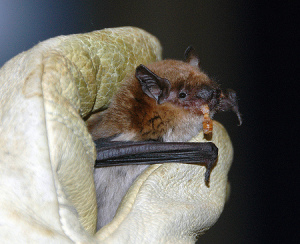Ford’s Pest of the Month: Bats
. Posted in advice - 0 Comments
Bats are the only true flying mammals, which have thin membranes that extend from the elongated forearm and fingers to the body’s hind limb. Their body is furry and their eyes are small with limited vision. They navigate by means of a sonar-like echolocation system, which enables them to avoid solid objects and detect flying insects in total darkness.
 A colony of bats can produce pounds of guano (bat droppings) that can stain through ceilings or even worse, break through and contaminate your living space. You may find guano next to your chimney within your attic, as the heated chimney provides comfort for overwintering. Large amounts of bat guano support the growth of a fungus called Histoplasma capsulatum. If the spores become airborne and are inhaled, a lung disease called histoplasmosis may develop.
A colony of bats can produce pounds of guano (bat droppings) that can stain through ceilings or even worse, break through and contaminate your living space. You may find guano next to your chimney within your attic, as the heated chimney provides comfort for overwintering. Large amounts of bat guano support the growth of a fungus called Histoplasma capsulatum. If the spores become airborne and are inhaled, a lung disease called histoplasmosis may develop.
Bats can carry ectoparasites (“bat bugs”), which are blood-feeding insects similar to bed bugs and mites. Bats are also a known vector of rabies, a viral disease that is fatal if not treated. As a preventative measure, please make sure your pets are vaccinated.
Do not handle a bat if it shows weakness or paralysis. Bats that have impaired flying ability or are viewed flying during midday may be rabid.
In the exclusion of bats, Ford’s Hometown Services uses no pesticides, poisons or traps and does not harm the bats in any way. Our methods involve finding and sealing all points of entry, excluding the bats with one-way doors, re-checking to be sure all are safely out of your home and then blocking entrance holes.
Geoff Ford, Vice President
Ford’s Hometown Service




